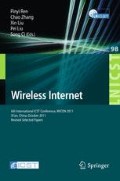Abstract
In this paper, optimal power allocation is investigated for maximizing the secrecy rate of orthogonal frequency division multiplexing (OFDM) systems under arbitrarily distributed input signals. Considering the discrete inputs are used in practical systems rather than the commonly assumed Gaussian inputs, we focus on secrecy rate maximization under more practical finite discrete constellations in this paper. It is known that the secrecy rate achieved by Guassian distributed inputs is concave with respect to the transmission power. However, we prove that the secrecy rate of finite discrete constellations is non-concave, which makes traditional convex optimization methods not applicable to our problem. To address this non-concave power allocation problem, we propose an efficient power allocation algorithm. Its gap from optimality vanishes asymptotically at the rate \(O(1/\sqrt{N})\), and its complexity grows in order of O(N), where N is the number of sub-carriers. Numerical results are provided to illustrate the benefits and significance of the proposed algorithm.
Access this chapter
Tax calculation will be finalised at checkout
Purchases are for personal use only
Preview
Unable to display preview. Download preview PDF.
References
Liang, Y., Poor, H.V., Shamai, S.: Information theoretic security. Found. Trends Commun. Inf. Theory 5, 355–580 (2008)
Wyner, A.: The wire-tap channel. Bell. Syst. Tech. J. 54(8), 1355–1387 (1975)
Csiszar, I., Korner, J.: Broadcast channels with confidential messages. IEEE Trans. Inf. Theory 24(3), 339–348 (1978)
Cheong, S.L.Y., Hellman, M.: The Gaussian wire-tap channel. IEEE Trans. Inf. Theory 24(4), 451–456 (1978)
Oggier, F., Hassibi, B.: The secrecy capacity of the MIMO wiretap channel. In: Proc. 45th Annu. Allerton Conf. Communication, Control and Computing, Monticello, IL, pp. 848–855 (September 2007)
Liu, T., Shammai, S.: A note on the secrecy capacity of the multi-antenna wiretap channel. IEEE Trans. Inf. Theory 55(6), 2547–2553 (2009)
Ekrem, E., Ulukus, S.: Gaussian MIMO multi-receiver wiretap channel. In: Global Telecommunications Conference, Honolulu, HI (November 2009)
Li, Z., Yates, R., Trappe, W.: Securecy capacity of independent parrallel channels. In: Proc. IEEE int. Symp. Information Theory(ISIT), Seattle, WA, pp. 356–360 (July 2006)
Liang, Y., Poor, H.V., Shamai, S.: Secure communication over fading channels. IEEE Trans. Inf. Theory 54(6), 2470–2492 (2008)
Jorswieck, E., Wolf, A.: Resource allocation for the wire-tap multi-carrier broadcast channel. In: Proc. International Workshop on Multiple Access Communications (MACOM), St. Petersburg, Russia (June 2008)
Renna, F., Laurenti, N., Poor, H.V.: Physical layer security for OFDM systems. In: European Wireless Conference, Vienna, Austria (April 2011)
Luo, Z., Zhang, S.: Duality Gap Estimation and Polynomial Time Approximation for Optimal Spectrum Management. IEEE Trans. Signal Processing 57(7), 2675–2689 (2009)
Luo, Z., Zhang, S.: Dynamic spectrum management: Complexity and duality. IEEE J. Sel.Topics Signal Process., Special Issue on Signal Process., Netw. Dyn. Spectrum Access 2(1), 57–73 (2008)
Yu, W., Lui, R.: Dual methods for nonconvex spectrum optimization of multicarrier systems. IEEE Trans. Commun. 54, 1310–1322 (2006)
Guo, D., Shamai, S., Verdu, S.: Mutual information and minimum mean-square error in Gaussian channels. IEEE Trans. Inf. Theory 51(4), 1261–1283 (2005)
Guo, D., Wu, Y., Shamai, S., Verdu, S.: Estimation in Gaussian noise: Properties of the minimum mean-square error. IEEE Trans. Inf. Theory 57(4), 2371–2385 (2011)
Jeffreys, H., Jeffreys, B.S.: Methods of Mathematical Physics, 3rd edn. Cambridge University Press, Cambridge (1988)
Boyd, L., Vandenberghe, S.: Convex Optimization. Cambridge University Press (2004)
Author information
Authors and Affiliations
Editor information
Editors and Affiliations
Rights and permissions
Copyright information
© 2012 ICST Institute for Computer Science, Social Informatics and Telecommunications Engineering
About this paper
Cite this paper
Qin, H., Sun, Y., Chen, X., Zhao, M., Wang, J. (2012). Optimal Power Allocation for OFDM-Based Wire-Tap Channels with Arbitrarily Distributed Inputs. In: Ren, P., Zhang, C., Liu, X., Liu, P., Ci, S. (eds) Wireless Internet. WICON 2011. Lecture Notes of the Institute for Computer Sciences, Social Informatics and Telecommunications Engineering, vol 98. Springer, Berlin, Heidelberg. https://doi.org/10.1007/978-3-642-30493-4_20
Download citation
DOI: https://doi.org/10.1007/978-3-642-30493-4_20
Publisher Name: Springer, Berlin, Heidelberg
Print ISBN: 978-3-642-30492-7
Online ISBN: 978-3-642-30493-4
eBook Packages: Computer ScienceComputer Science (R0)

